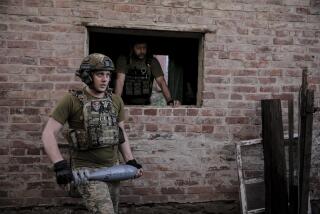Russia Moves to Allow Import of Nuclear Waste
- Share via
MOSCOW — Russian lawmakers gave resounding approval Wednesday to a plan that would turn sections of Siberia into one of the world’s largest nuclear waste dumps--a project that the United States in effect has the power to veto.
The Russian government says it can earn an estimated $20 billion over 10 years by importing spent nuclear fuel from power plants in Europe and Asia and that the money can be used to clean up the environment and safeguard nuclear storage sites.
The proposal is opposed by environmentalists and liberals, who argue that Russia has enough trouble keeping a lid on its own nuclear materials without importing an estimated 20,000 tons more over the next decade.
About 90% of the spent fuel Russia could import from reactors in Europe and Asia was originally supplied by the United States and cannot be transferred to a third country without U.S. permission--which means the long-term success of the Russian plan depends on Bush administration approval.
In Washington, the administration expressed doubts about the plan but did not close the door on it.
The State Department said in a statement that the U.S. “would want to be assured that the transfer was for eventual disposal and not for reprocessing” and that the fuel would be safely and securely transported and stored.
“An especially important factor would be the nature of Russia’s nuclear cooperation with third parties,” the statement noted.
The lower house of Russia’s parliament, the State Duma, voted on three bills that would change the law to permit the import of nuclear waste. The measures passed by comfortable margins--266-117, 243-125 and 250-125--but must still pass the upper house and would require President Vladimir V. Putin’s signature.
Approval by the upper house, or Federation Council, is usually a formality. But several members, including Chairman Yegor S. Stroyev, suggested that the chamber may not rubber-stamp the bills.
Stroyev is governor of the Orel region in western Russia, which was contaminated when the Chernobyl nuclear power plant exploded in 1986.
“We, people living in the Chernobyl zone, are very much afraid of any wrong move here,” Stroyev said after the Duma vote. “Russia can’t be the world’s dump site. If we take this step, it should be not for the money but first and foremost for the sake of people’s health.”
Russia’s plans to import spent nuclear fuel are part of a brewing global crisis over the storage of nuclear wastes. U.S. plans to create a long-term underground storage facility in Yucca Mountain, Nev., have been vehemently opposed by environmentalists and several influential Western governors.
Prime customers for Russia include South Korea and Taiwan, both of which have U.S.-built reactors and are rapidly running out of temporary waste storage.
Spent nuclear fuel contains plutonium, which can be separated out and reused for other purposes, either as a means of generating electricity or as fuel for nuclear weapons. As a result, in addition to being dangerously radioactive, spent fuel also poses a strategic security risk.
For this reason, U.S. policy has traditionally opposed reprocessing spent nuclear fuel. However, in his National Energy Plan released last month, President Bush suggested that this prohibition be reconsidered.
The Russian Ministry of Atomic Energy clearly intends not just to store the imported spent fuel but also eventually to reprocess it, should that prove technologically and economically feasible. The ministry has been pushing to develop a new generation of breeder reactors, which produce far more energy than standard reactors but also yield more plutonium than they consume.
Environmentalists in Russia and the United States are opposed to the storage proposal approved Wednesday, citing past environmental disasters. Vladimir Kuznetsov, director of the Nuclear and Radiation Safety Program at the Russian Green Cross environmental group, estimates that there have been 250 accidents at Russian nuclear fuel plants since 1949.
“The situation at Russian nuclear storage facilities is well known--they are old, crumbling and need to be either closed down or overhauled,” said Kuznetsov. “And in a situation when Russia cannot handle its own nuclear waste properly, [the Duma] is urging that we import some more? What were the deputies thinking about when they voted in favor of these laws?”
Several polls suggest that the vast majority of Russians--somewhere between 80% and 90%--oppose the plan.
Critics also voice concern over how the spent fuel will be transported safely for thousands of miles. And U.S. experts say that as long as Moscow continues to cooperate in the nuclear field with Iran, Washington is unlikely to give its blessing on spent-fuel imports. Talks are likely to drag on for months or years.
“It will be years before Russia starts accepting spent fuel for storage,” said Jon Wolfstal, a proliferation expert at the Washington-based Carnegie Endowment for International Peace. “Nothing in this field moves quickly.”
*
Times staff writer Norman Kempster in Washington and Alexei Kuznetsov of The Times’ Moscow Bureau contributed to this report.
More to Read
Sign up for Essential California
The most important California stories and recommendations in your inbox every morning.
You may occasionally receive promotional content from the Los Angeles Times.













